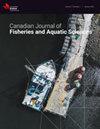Assessing the trophic ecology of Southern Ocean Myctophidae: the added value of DNA metabarcoding
IF 2.2
2区 农林科学
Q2 FISHERIES
Canadian Journal of Fisheries and Aquatic Sciences
Pub Date : 2023-10-23
DOI:10.1139/cjfas-2023-0079
引用次数: 0
Abstract
Lanternfishes (Myctophidae) are key components of mesopelagic fish communities globally. In the Southern Ocean, incomplete information on myctophid diets limits our understanding of their energetics, interactions and wider ecosystem impact. Traditional microscopic methods of diet analysis have relatively coarse prey resolution and possible taxonomic and observer biases. DNA metabarcode sequencing promises higher taxonomic and temporal resolution, but uncertainty remains in comparing this is with microscopy-based analyses. Here, we applied 18S DNA metabarcode sequencing to stomach contents from twenty Electrona antarctica individuals which had previously been examined via microscopic analysis. Across all fish, crustacean and gastropod taxa dominated the prey identified via both methods, with broad agreement between methods on the relative abundance of different prey items. DNA metabarcode sequencing recovered greater taxonomic diversity and resolution, particularly for soft-bodied prey items and small crustaceans. DNA sequencing results also more clearly differentiated diet between individuals collected from different environments. Overall, our findings illustrate how DNA based methods are complementary to, and consistent with, traditional methods and can provide additional, high-resolution data on a range of trophic interactions.南大洋水母科营养生态评估:DNA元条形码的附加价值
灯笼鱼是全球中远洋鱼类群落的重要组成部分。在南大洋,关于嗜菌菌饮食的不完整信息限制了我们对它们的能量学、相互作用和更广泛的生态系统影响的理解。传统的显微食性分析方法具有相对粗糙的猎物分辨率和可能的分类和观察偏差。DNA元条形码测序承诺更高的分类学和时间分辨率,但与基于显微镜的分析相比仍存在不确定性。在这里,我们对20只南极电子虫的胃内容物进行了18S DNA元条形码测序,这些胃内容物之前已经通过显微镜分析进行了检查。在所有鱼类中,甲壳类动物和腹足类动物在两种方法识别的猎物中占主导地位,两种方法在不同猎物的相对丰度上基本一致。DNA元条形码测序恢复了更大的分类多样性和分辨率,特别是对软体猎物和小型甲壳类动物。DNA测序结果也更清楚地区分了来自不同环境的个体之间的饮食差异。总的来说,我们的研究结果说明了基于DNA的方法是如何与传统方法相补充和一致的,并且可以提供关于一系列营养相互作用的额外的高分辨率数据。
本文章由计算机程序翻译,如有差异,请以英文原文为准。
求助全文
约1分钟内获得全文
求助全文
来源期刊

Canadian Journal of Fisheries and Aquatic Sciences
农林科学-海洋与淡水生物学
CiteScore
4.60
自引率
12.50%
发文量
148
审稿时长
6-16 weeks
期刊介绍:
The Canadian Journal of Fisheries and Aquatic Sciences is the primary publishing vehicle for the multidisciplinary field of aquatic sciences. It publishes perspectives (syntheses, critiques, and re-evaluations), discussions (comments and replies), articles, and rapid communications, relating to current research on -omics, cells, organisms, populations, ecosystems, or processes that affect aquatic systems. The journal seeks to amplify, modify, question, or redirect accumulated knowledge in the field of fisheries and aquatic science.
 求助内容:
求助内容: 应助结果提醒方式:
应助结果提醒方式:


